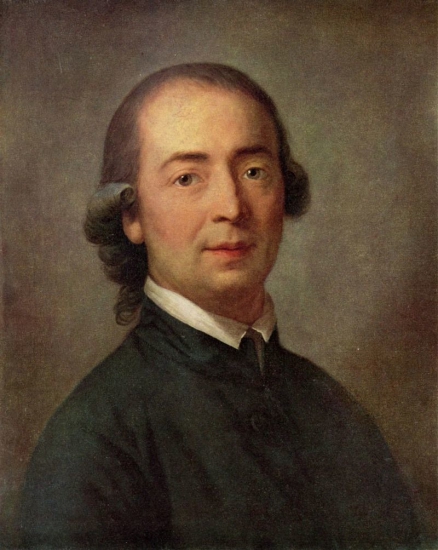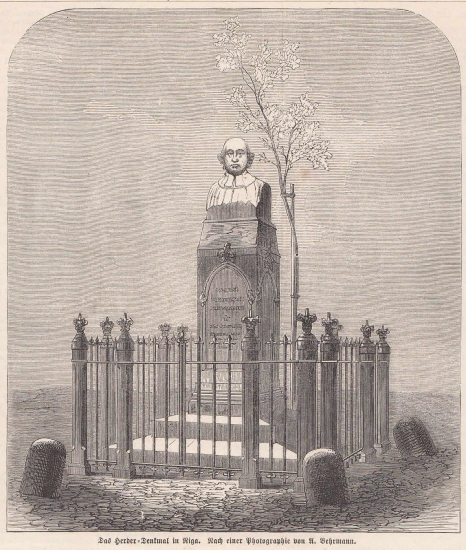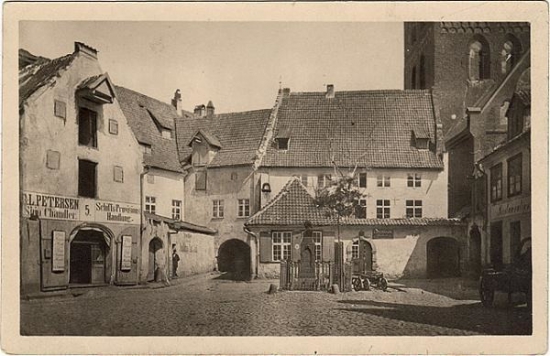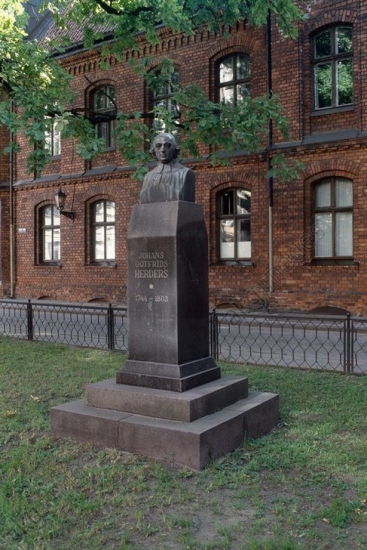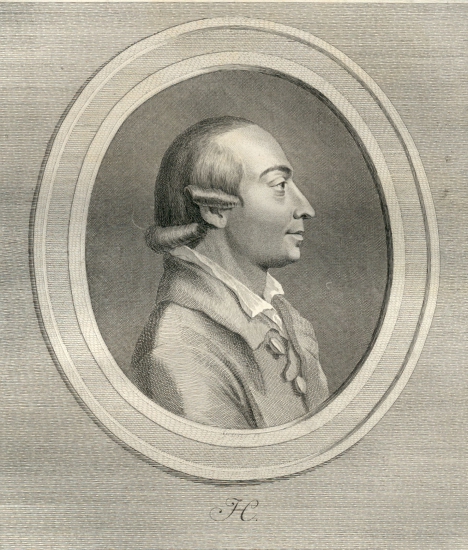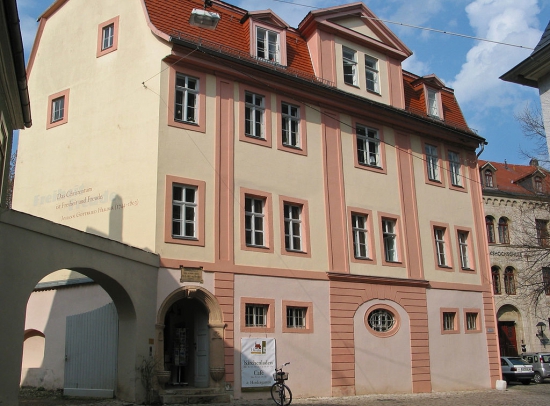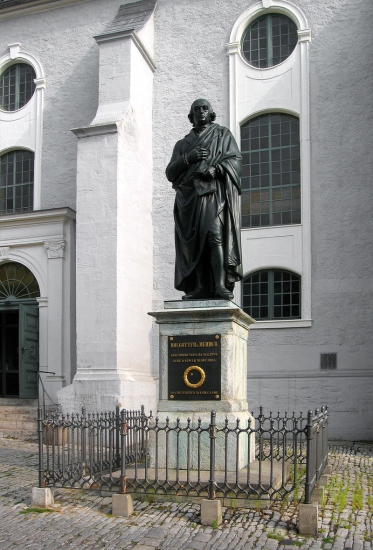Johann Gottfried Herder
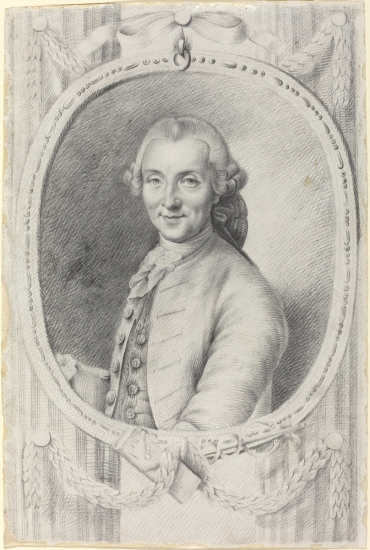 8 pictures
8 pictures
25.08.1744 – 18.12.1803
Herder
was a teaching assistant in Riga at the Dome School (1764-1769), an
assistant to the city librarian (1764-1769) and an assistant pastor
in the churches of Gertrude and Jesus (1767-1769). Herder came to
Riga at the invitation of Johann Gotthelf Lindner, the Rector of the
Dome School, who moved to Königsberg. At the suggestion of his
fellow student and friend Hamman, Herder met with patricians and
merchants in Riga and became friends with the Berens family, and
became part of the German intellectual circle of Riga. Herder formed
a close friendship with the publisher Johann Friedrich Hartknoch and
later his son. The Hartknochs published almost all of Herder's works
from the Riga period and continued to publish Herder's manuscripts
until the end of Herder's life in 1803. In 1766, in Riga, Herder was
admitted to the Masonic Lodge Zum Schwert ("At the Sword").
With his works on German literature in Riga, Herder gained
recognition in German-speaking Europe and began correspondence with
the German poet Johann Ludwig Gleim (1719-1803) and the German
writer, publisher and literary critic Friedrich Nicolai (1733-1811).
In
1769 Herder left Riga with Gustav Berens (1725 - 1792). On
the way to Nantes, aboard a ship, Herder Journal
meiner Reise im Jahr 1769("My Travel Journal", publ.1846) and never returned to
Riga.
Herder
has made a special contribution to folklore studies, incl. in the
actualization of folk songs in Europe. Herder’s interest in Latvian
folk seems to have been stirred by the tradition of celebrating
Midsummer in the suburbs of Riga. Herder focused on collecting and
systematizing folk songs since Riga period. He stimulated Baltic
German interest in Latvian folklore. August Wilhelm Hupel, Herder’s
associate and collaborator, sent him at least 78 lyrics of Latvian
folk songs, with and without translations into German, and one
musical notation for the tune. Hupel obtained them mainly from his
German colleagues in Vidzeme - pastors in Latvian churches. Along
with songs from other nations, Herder included eleven Latvian folk
songs translated into German, along with commentaries, in
Volkslieder
(Folk Songs, 1778-79); a reprint of which was published under the
title Stimmen
der Völker in Liedern
(The Voices of the People in Songs, 1807). This is the first work
that introduces the European German-speaking reader to Latvian folk
songs. Today, Latvian folk songs sent to Herder are stored in the
Herder Archives in Berlin. It is an important testimony of the
Latvian folk songs and their traditions in the 18th century.
Birth time/place
25.08.1744
Moronga
Moronga /Mohrungen 18. gadsimtā ir Prūsijas teritorijā.
Place/time of death
18.12.1803
Veimāra
Personal information
Herder
develops a close and lasting friendship with the Hartknochs, a family
of publishers, when in Riga. Its importance can be measured not so
much in terms of the exchange of ideas as it is in financial
assistance. For some time, Herder was staying at the Hartknochs’
house, often plays musical instruments, while the Hartknochs hope
that Heder will be their home tutor, which never happens. Not only do
the Hartknochs pay Herder the highest royalties, but also
occasionally manage Herder's correspondence, incl. Herder’s letters
to his mother, and financially support his travels, incl. from Riga
to Nantes in late spring of 1769. On the recommendation of Herder,
Hartknoch publishes the works of the French philosopher Rousseau.
Herder
became acquainted with Garlieb Helwig Merkel from Vidzeme already in
Germany. Merkel stayed in Germany from 1796 to 1806. Herder also
wrote a review of G.Merkel's "Latvians" (Erfurter
Nachrichten,
1797) and, following Herder's recommendation, Merkel went to
Copenhagen in 1797 to be a secretary of the Minister of Finance,
Count Schimmelmann. After Herder's death, Merkel developed close
friendship and correspondence with Herder's wife, Caroline Herder
(1750-1809).
Herder
was appointed to the nobility in 1802, after which he was given the
title von
before the surname.
Professional activity
Herder
worked in Riga as a teaching assistant in the Dome School, as
assistant librarian for the city library and as assistant pastor for
suburban churches. In Riga, Heder also wrote a lot about pedagogical,
linguistic, religious, philosophical, etc. issues and composed
occasional poetry, literary critical articles. Herder's list of works
contains the most important works of the Riga period, as well as
those that were first published in Riga during Herder's life.
The most important works of Riga period
1766: "The Sound of Songs at the Consecration of the Bikernieki St. Catherine's Church" is the only Herder’s work published in Latvian. This is a German translation of Christian Ravensberg, pastor of St. John's Church in Riga.1767: Über die neuere Deutsche Literatur: Fragmente, als Beilagen zu den Briefen, die neueste Literatur betreffend . A collection of literary-critical articles in 3 volumes, more commonly known asFragmente über die neuere Deutsche Literatur, or "Fragments of the latest German literature. With this work, Heder becomes widely known in the German-speaking European environment and acquires his correspondents, the most prominent German writers.
1769: Kritische Wälder. Oder Betrachtungen, die Wissenschaft und Kunst des Schönen betreffend, nach Maasgabe neuerer Schriften, or "Critical Forests. Or Reflections on Science and the Fine Arts," which puts an important emphasis not only on aesthetics but also on the philosophy of language.
First editions of 11 Latvian folk songs sent to Herder
1778/79: Volkslieder or "Folksongs", the collection consists of two parts, organized according to the thematic principle, 11 Latvian folk songs and comments are included in Part 2 (pages 87-92 and 111-113) .1807: Stimmen der Völker in Liedern , or "Voices of the People in Songs", is a collection that is published after Herder's death. In Johann von Miller's arrangement, it acquired a new geographical principle. Miller starts with the introduction of Nordic (Scandinavian) songs and soon reaches the Baltics. Estonian, Latvian and Lithuanian songs are published at the beginning of the collection (Latvian songs from pages 94 to 96).
Sermons and religious treatises
In his last sermon at the Church of Jesus, Heder emphasized that his sermons are for listening, but not for reading. Thus, some of the sermons, although preserved, were first published in Herder's collected works (33 vol., Berlin, 1877-1913) by Bernhard Suphan in the late 19th century, such asÜber das Gebet , Über die Göttlichkeit und Gebrauch . After leaving Riga, in the last two decades of the 18th century, Herder still published his biblical and religious essays at Hartknoch’s publishing house in Riga.Literary-critical, pedagogical and philosophical essays
Although collected works are published in Herder's lifetime, they are incomplete and many, including essays and speeches, fragments and drafts from the Riga period remain unpublished. A great deal of work in this regard is done by Herder's son Emil Gottfried von HERDER (1783-1855), who publishes Herder's manuscripts and letters in 1846 in 3 volumes (Volume 1 in 3 books; Volume 2 and Volume 3 in 2 books). J.G.Herder`s Lebensbild. Sein chronologisch-geordneter Briefwechsel, verbunden mit den hierhergehörigen Mittheilungen aus seinem ungedruckten Nachlasse, und mit den nöthigen Belegen aus seinen und seiner Zeitgenossen Schriften ("The Life of J.G. Herder. His chronologically arranged correspondence is published together with his writings from his unpublished heritage and the respective supplements from the articles written by him and his contemporaries”). This valuable publication is in the possession of the National Library of Latvia.However, in the 19th and 20th centuries, when publishing Herder's collected works, new manuscripts previously unknown to the general public are often found. Herder's foundation at the Berlin State Library is crucial for studying his life and activities.
Quotes
"Das Herdersche in Herder ist in Riga gewachsen" [Herderiskais Herders ir izaudzis Rīgā].
Kurt Stavenhagen. Herder in Riga. Riga: G. Löffler, 1925, S.13.
"Mighty
King of the Spirits, rich in Grace,
Known
for "mischief", that can enchant you;
You
love to ring the Latvian poetry clock.
Divine
voices are heard - heard at the ends of the world."
Translated from: Auseklis.
To Herder. Ozolu
vaiņaki.
Collected works by Auseklis. Riga: Gulbis
[b.g.],
p.245
"But
even more excitement for the younger generation was in Herder’s
imaginative and enthusiastic writings and his persona. For Goethe,
meeting Herder in Strasbourg was, as he himself acknowledged, the
most important event that determined the trajectory of his spirit and
character. Herder was only five years older than Goethe, but
experienced and self-reflective, with wide and new views on poetry,
art, history, philosophy. Herder opened with his writings an
understanding of true poetry, showing that poetry is not only the
property and accessory of the so-called educated classes, but of all
and every nation and nationality; that its source is in the views and
feelings of the people, and that true poetry is natural and full of
character; he glorified natural folk songs in contrast to art poetry
(..) nature is superior to art, primordial to unnatural! (Urnatur
wider Unnatur),
same: "retourner à la nature" as in 1793, only a quiet
sidewalk. "wider Unnatur), same: "retourner à la nature"
as in 1793, only a silent ripple. "
Translated from: Rainis.
From Goethe for new days. Literary review. Collected papers. Volume
18, Riga: Zinātne, 1982, 274.
"...
Latvians also have to mark this noble spirit rich in ideas, who, with
a deeper understanding of poetry than his predecessors, has
contributed to the development of literature worldwide, especially,
of course, in his fatherland Germany, and as a result has found our
partially strewn creek."
Translated from: Ludis Bērziņš. Greznas dziesmas. Riga: Zinātne, 2007, 89.lpp.
"Bille
cries (..) She can get to the fence of Herder's monument. At least
there is a place to grip at and support her head. A pair of barely
lit school windows illuminated by a single lamp are seen from across
(..) Bille has to deal with it herself. She takes a deep breath,
tries to compose herself and when ready lifts her eyes. Herder looks
at her. Again, the boys turned the broken head upside down.
"You
are not doing well eiter, old man," Bille sighs. There are a few
short gasps, and she can finally release her grip on the cold grid.
If only her legs were not so terribly painful."
Translated from: Vizma
Belshevica. Billes
skaistā jaunība.
Riga: Jumava, 1999, p. [episode from study time at the 2nd Riga
Polygraphy Vocational School, 1946-1948].
Recepction
1903:
Alexander von Freytag-Loringhoven. Herder
in Riga: Festspiel in einem Aufzuge zu Herders 100jährigen
Todestage
[Paly. "Herder in Riga: Festive performance in One Act for the
100th Anniversary of the Death of Herder" - stamped copy,
transcript. National Library of Latvia RXA 422, 25].
1904:
K.Walter. Herders Wirken und Wachsen in Riga. Baltische
Monatschrift,
No. 57, S.28-49. [extensive publication dedicated to Herder's work in
Riga]
1909:
Georg Berkholz. Festvortrag
bei Enthüllung des Herder-Denkmals, Geschichte des Wortes
"baltisch". Riga:
Jonck&Poliewsky.
1917:
Arend Buchholtz. [Herder in Riga]. Ostsee
und Ostland. Hrsg.von
Dr.Otto Grautoff. I
Die Baltischen Provinzen. Bd.
6 Bilder
aus baltischer Vergangenheit. Berlin:
F.Lehmann, S. 77-83. [general insight into Herder’s Riga period].
1978:
Walter Dietze. Johann
Gottried Herder: Weltbild, Menschbild, Wirkung.
Weimar: Ständige Kommision für Kultur bei der
Stadtverordnetenversammlung der Stadt Weimar. [Monograph on Herder's
Life and Activities, Second Edition, 1980]
1989:
Bultmann, Christoph. Herder als Schüler des Philologen Michaelis.
Zur Rigaer Erstfassung der »Archäologie« Bückeburger
Gespräche über Johann Gottfried Herder 1988: Älteste Urkunde des
Menschengeschlechts. Hrsg. v. Brigitte Poschmann. Rinteln,
S.
64-80. [the article looks at a particular aspect of Herder's views,
his concept of "archeology", the development of which began
in Riga, and the influence of Johann David Michaelis (1717-1791) on
Herder].
1990:
Menze, Ernest A. Königsberg and Riga: the genesis and significance
of Herder’s historical thought. Herder
today: contributions from the International Herder Conference, Nov.
5-8, 1987, Stanford, California / edited by Kurt Mueller-Vollmer.
BerliN; New York: W. de Gruyter,
S. 90-107. [Herder's ideas on the historical perspective in
Königsberg and Riga periods].
1991:
Johann Gottfried Herder. Selected
early works, 1764-1767: Addresses, essays and drafts; fragments on
recent German literature. Ed.
Ernest A.Menze, Karl Menges. Pennsylvania: Pennsylvania State
University [selection of Herder's articles, drafts, excerpts with
commentaries of Riga period].
1996:
Gisela von Busse. Herder
auf Reisen: drei Kapitel aus seinem Leben: seinen Briefen,
Tagebüchern, Schriften und nacherzählt. Hans-Busso
von Busse. [Monograph on Herder's travels, beginning with a sea
voyage to France from Riga].
1999:
Paul Mitzenheim. Herder und Riga. Europa
in der Frühen Neuzeit,
ed. Erich Donnert, Vol. 5. Weimar: Böhlau, S. 495-503.
2004:
Couturier, Daniel. Herder
à Nantes et à Angers en 1769. Longué:
Vieux Logis [includes Herder's sea voyage from Riga to Nantes in
1769].
2007:
Tadeusz Zubiński. Herder
w Rydze i inne szkice bałtyckie.
Toruń : Wydawnictwo Adam Marszałek [Herderu Rīgā un Baltijas
skices].
2008: Singing
the nations: Herder`s legacy.
Ed.Dace Bula, Sigrid Rieuwerts. Trier: Wissenschaftlicher
Verlag.
2013: John Vivian. Herders “weltmännische
Bildung” in Riga 1764-1769. In: Triangulum 19
(2013), S. 87-118. [Riga period in Herder's Life as the time of
evolvement of "Citizen of the World"].
2014:
Guntis Šmidchens. Herder`s discovery of Baltic Songs. The
power of song: nonviolent national culture in the Baltic singing
revolution.
Seattle: University of Washington Press.
2016: Kaspar
Renner. Herder in Riga. 1764-1769: Quellen zur
Wirkungsgeschichte. Zeitschrift
für Germanistik 26
(2016), 118-133. [Herder's Riga period: source studies aspect].
2016:
Bellmann, Tina. Die
Interdependenz von Selbst- und Gotteserkenntnis: Herders Rigaer
Predigten. J.
G. HERDER: FROM COGNITION TO CULTURAL SCIENCE / VON DER ERKENNTNIS
ZUR KULTURWISSENSCHAFT. Contributions based on the 2014 Conference of
the International Herder Society at Purdue University, West
Lafayette, Indiana. Edited by Beate Allert. Heidelberg: Synchron, S.
49-62 [article
includes analysis of Herder's Riga sermons].
2017:
Raynal-Herder-Merkel. Transformationen
der Antikolonialismusdebatte in der europäischen Aufklärung. Hrsg.
von Zorl-Gothart Mix, Hinrich Ahrend in Zusammenarbeit mit Kristina
Kandler [Insights into the European Enlightenment Polemics Against
Colonialism among Rainal, Heder and Merkel].
2019:
Kaspar Renner. Herder und die gelehrte Öffentlichkeit in Riga. Eine
Relektüre der "Publikumsschrift" von
1756. Baltisch-deutsche
Kulturbeziehungen vom 16. bis 19. Jahrhundert: Medien, Institutionen,
Akteure. Bd, 2 Zwischen Aufklärung und Nationalem Erwachen.
Hrsg. von Raivis Bičevskis, Jost Eickmeyer, Andris Levans.
Heidelberg: Universitätsverlag Winter, S.217-235.
Name at birth
Johann Gottfried von Herder
Additional names
Johans Gotfrīds Herders
Education
1762–1764
University of Königsberg
Kaļiņingrada
Studējis teoloģiju, klausījies lekcijas pie I.Kanta, apmainījies ar idejām ar J.G.Hāmani, T.G.Hipelu, J.G.Šefneru un citiem
Residence
1764–1769
Herdera laukums
Norāde avīzē "Rigasche Stadtblätter" (1856, nr.5, S.39):...Bewohner des dem Hause des Hofgerichts-Advocaten Petersen gegenüber belegenen Schul-Eckhauses bei der kleinen Wage [Iedzīvotājs namā, kas atrodas galmatiesas advokāta Petersena mājai pretī pieguļošās skolas stūrī pie Mazajiem svariem].
Memorials
25.08.1764
Herdera laukums
Par godu simtajai gadadienai kopš Herdera ierašanās Rīgā un 120. gadadienai kopš viņa dzimšanas 1864. gadā atklāts piemineklis bijušajā Mazo Svaru laukumā pretī mājai, kurā Herders dzīvojis - J.G.Herdera krūšutēls uz čuguna postamenta. Paraugs: Herdera piemineklis Veimārā (Herders mācītāja talārā pilnā augumā). Arhitekts Ludvigs Šallers (Schaller, 1804-1865). Uzraksti uz pieminekļa: "Johann Gottfried Herder. Licht, Liebe, Leben. 25.VIII 1864." [Johans Gotfrīds Herders. Gaisma, mīlestība, dzīve] - dzīves moto uz zīmoggredzena un kapakmens; zem tā: "Collaborator der Dom-Schule und Pastor adj. an den Vorstadt-Kirchen in Riga, 1764-1769" [Domskolas palīgskolotājs un palīgmācītājs priekšpilsētas baznīcās Rīgā, 1764-1769]; pa labi: "geboren den 25. August 1744 in Mohrungen (Ost-Preussen)" [dzimis 25. augustā Morungenā, Austrumprūsijā], pa kreisi: "Gestorben d.18.December 1803 in Weimar" [miris 18. decembrī 1803. gadā Veimārā]. Pie pieminekļa iestādīts ozols, ap to izvietota barokāls dzelzs žogs ar margām.1950. gados pieminekli demontē, postamentu domājams pārkausē. 1959. gadā sakarā ar Vācijas Demokrātiskās republikas vadītāju vizīti Rīgā Herdera pieminekli steidzīgi atjauno pēc arhitekta Kārļa Plūksnes norādījumiem, uzstādot uz granīta postamenta ar uzrakstu "Johans Gotfrīds Herders (1744-1803)" vienīgi latviešu valodā.
1921–1941
Riga Herder Society
Rīga
Ar J.G.Herdera vārdu saistītā biedrība dibināta Rīgā ar mērķi izveidot un atbalstīt Herdera institūtu, augstāko mācību iestādi Baltijas vāciešiem Baltijā. Biedrībai arī nozīmīga loma sakaru uzturēšanā starp Vāciju un Latviju starpkaru periodā.
1921–1939
Herder Institute in Riga
Elizabetes iela 29, Rīga
Herdera vārdā nosaukts institūts Rīgā, kas sniedz Baltijas vāciešiem iespēju iegūt augstāko izglītību dzimtenē un savā dzimtajā valodā. Institūts ir arī nozīmīgs vācbaltiešu kultūras izpētes centrs. Pēc institūta slēgšanas Rīgā un vācbaltiešu izceļošanas 1939. gadā daļa no vācbaltiešu arhīviem un dokmentu kolekcijām nokļuva Mārburgā (Vācijā), kur 1950. gadā tika izveidots "Herdera institūts" - pētniecības centrs vācbaltiešu kultūras Baltijā izpētei. Herdera institūts ar bagātu arhīvu un bibliotēku Marburgā darbojas joprojām.
1991
Riga Herder Secondary School
Skolas iela 25, Rīga
Skola ieguvusi J.G.Herdera vārdu 1991. gadā. Rīgas Herdera vidusskola izveidojusies no bijušās Rīgas 12. vidusskolas ar krievu mācībvalodu. 2014. gadā skola pievienota Rīgas Krievu vidusskolai un ieguvusi J.G. Herdera Rīgas Grīziņkalna vidusskolas nosaukumu. Pašlaik skola atrodas Latgales priekšpilsētā.
Working place
01.1765–05.1769
Riga City Library
Rīgas Doma krusteja
Bibliotekārs, citos avotos - bibliotekāra palīgs.
24.02.1765–08.05.1769
Rīgas Domskola
Mazā Skolas iela, Rīga
1765. 14.02. Herders kārto teoloģisku eksāmenu; 1765. 24.02. apstiprināts Domskolas skolotāja palīga (Collaborator) amatā. 1769. 8.05. Lūgums atbrīvot no amata.
06.07.1767–08.05.1769
Parish of Snt. Gertrud
Rīgas Vecā Svētās Ģertrūdes Evaņģēliski luteriskā baznīca
Strādā par mācītāja palīgu jeb adjunktu.
07.1767–09.05.1769
Parish of Jesus Church of Riga
Rīgas Jēzus baznīca
Strādāpar mācītāja palīgu jeb adjunktu.
1771–1776
Bikeburga
Virsmācītājs un konsistorijas padomnieks, Herdera raksti būtiski ietekmē Vētras un dziņu laikmetu vācu literatūrā. Herdera piemiņai Bikeburgā uzstādīts piemineklis.
1776–1803
Evangelically Lutheran Parish in Weimar
Veimāra, Pētera un Pāvila baznīca
Herders ir Saksijas-Veimāras hercogistes ģenerālsuperintendents un Veimāras virsmācītājs, apglabāts Pētera Pāvila baznīcas, dzīvojis mājā blakus baznīcai.
Travelled
1766–1768
Grāvenheides muiža
pavada vasaras draugu lokā Juglas ezera krastā un, iespējams, vēro latviešu Jāņu rituālu, sacer veltījuma dzejoli Grāvenheides muižai (1766)
01.10.1766
Biķeru (Biķernieku) evaņģēliski luteriskā baznīca
Dalība pie baznīcas iesvētīšanas ar paša sacerētu tekstu apsveikuma kantātei.
1769–1771
Parīze
No 1769. gada rudens līdz 1771. gadam Herders ceļo: Parīze, Brisele, Antverpene, Amsterdama, Hamburga, Eitne (Eutin), Hanovera, Kasele, Getingene, Strasburga, Bikeburga
05.06.1769–15.07.1769
Nante
Jūras ceļojums kopā ar Rīgas paziņu Georgu Bērensu no Rīgas uz Nanti. Nantē Herders pavada laiku līdz 4. novembrim Bērensa draugu namā, tad dodas tālāk uz Parīzi, kurā ierodas 8. novembrī 1769. gadā
Buried
1803
Veimāra
Apglabāts Veimāras sv. Pētera un Pāvila baznīcā, kas tagad tiek saukta par Herdera baznīcu.
